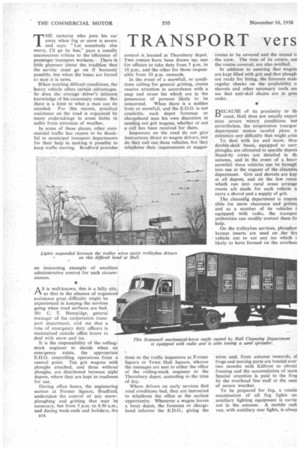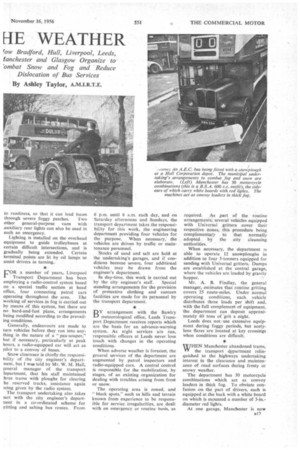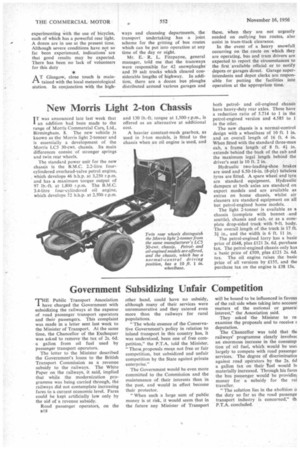TRANSPORT vers
Page 50

Page 51

Page 52

If you've noticed an error in this article please click here to report it so we can fix it.
FIE WEATHER
row Bradford, Hull, Liverpool, Leeds, fanchester and Glasgow Organize to 'ombat Snow and Fog and Reduce Dislocation of Bus Services
By Ashley Taylor, A.M.I.R.T.E. THE motorist who puts his car away when fog or snow is severe
and says: "Let somebody else worry, Ill go by bus," pays a usually unconscious tribute to the efficiency of passenger transport workers. There is little glamour about the tradition that , the service must go on if humanly possible, but when the buses are forced • ta stop it is news.
When tackling difficult conditions, the heavy vehicle offers certain advantages.
So does the average driver's intimate knowledge of his customary routes. But
there is a limit to what a man can do unaided. For this reason, practical assistance on the road is organized by• many undertakings in areas liable to suffer from extremes of weather.
In some of these places, other commercial traffic has reason to be thank ful to municipal transport departments for their help in making it possible to keep traffic moving. Bradford provides an interesting example of excellent administrative control for such circumstances.
As is well-known, this is a hilly city, so that in the absence of organized assistance great difficulty might be experienced in keeping the services going when road surfaces are bad. Mr. C. T. Humpidge, general manager of the corporation transport department, told me that a rota of emergency duty officers is maintained outside office hours to deal with snow and ice.
It is the responsibility of the rollingstock engineer to decide when an emergency exists, the appropriate E.D.O. controlling operations from a central point. Ten grit wagons with ploughs attached, and three without ploughs, are distributed between eight depots, where they are kept in readinesi for use.
During office hours, the engineering section at Forster Square, Bradford, undertakes the control of any snowploughing and gritting that may be necessary, but from 5 p.m. to 8.30 a.m., and during week-ends and holidays. the B16 control is located at 'Thornbury depot. Two rosters • have been drawn up, one for officers to take duty from 5 p.m. to 10 p.m., and the other for those responsible from 10 p.m. onwards.
In the event of a snowfall, or conditions calling for general gritting, routes receive attention in accordance with a map and street list which are in the possession of persons likely to be concerned. When there is a sudden frost or snowfall, and the E.D.O. is not available, each depot foreman or chargehand uses his own discretion in sending out grit wagons, whether or not a call has been received for them.
Inspectors on the road do not give instructions direct to wagon drivers, nor do they call out these vehicles, but they telephone their requirements or sugges
tions to the traffic inspectors at Forster Square or Town Hall Square, whence the messages are sent to either the office of the rolling-stock engineer or the Thornbury depot, according to the time of day.
Where drivers on early services find road conditions bad, they are instructed to telephone the office at the earliest opportunity. Whenever a wagon leaves a local depot, the foreman or chargehand informs the E.D.O., giving the routes to be covered and the names o the crew. The time of its return, am the routes covered, are also notified.
In addition to assuring that wagon are kept filled with grit and that plough are ready for fitting, the foremen mak regular checks on the availability o shovels and other necessary tools anc see that anti-skid chains are in gooc order.
BECAUSE cff its proximity to th( coast, Hull does not usually experi ence severe wintry conditions but nevertheless, the corporation transpor department makes careful plans t( minimize any difficulty that might arise
To deal with ice and snow, threl double-deck buses, equipped to carr: ploughs, are allocated to specific depots Stand-by crews are detailed in till autumn, and in the event of a hew snowfall these vehicles can be brough into use at the request of the cleansim department. Grit and shovels are kep at all depots, and on the few route which run into rural areas arrange ments ale made for each vehicle tc carry a shovel and a supply of grit.
The cleansing department is respon sible for snow clearance and griffin; and as a number of its vehicles i equipped with radio, the transpor authorities can readily contact them fo help.
On the trolleybus services, phosphor bronze inserts are used on .the firs vehicle out to cut any ice which i likely to have formed on the overhea( wires and, from autumn onwards, al frogs and moving parts are treated ever two months with Kilfrost to obviat freezing and the accumulation of snow Special attention is paid to the frog by the overhead line staff at the onse of severe weather.
To be prepared for fog, a routin examination of all fog lights an auxiliary lighting equipment is carrie out in the autumn. A mobile radi van, with auxiliary rear lights, is alway in readiness, so that it can lead buses through severe foggy patches. Two other general-purpose vans with auxiliary rear lights can also be used in such an emergency.
Lighting is installed on the overhead equipment to guide trolleybuses at certain difficult intersections, and is gradually being extended. Certain terminal points are lit by oil lamps to assist drivers in turning.
FOR a number of years, Liverpool Transport Department has been employing a radio-control system based on a special traffic section at bead office, four connecting patrol cars operating throughout the area. The working of services in fog is carried out by means of this system, but there are no hard-and-fast plans, arrangements being modified according to the prevailing conditions.
Generally, endeavours are made to turn vehicles before they run into anything in the nature of a " pea-souper," but if necessary, particularly at peak hours, a radio-equipped car will act as pilot to a convoy of buses.
Snow clearance is chiefly the responsibility of the city engineer's department, but I was told by Mr. W. M. Hall, general manager of the transport lepartment, that his staff maintained 'hree trams with ploughs for clearing he reserved tracks, assistance again seing given by the radio system.
The transport undertaking also takes ,art with the city engineer's departnent in a co-ordinated scheme for Offing and salting bus routes. From 6 p.m. until 8 a.m. each day, and on Saturday afternoons and Sundays, the transport department takes the responsibility for this work, the engineering department providing four vehicles for the purpose. When necessary, the vehicles are driven by traffic or maintenance personnel.
Stocks of sand and salt are held at the undertaking's garages, and if conditions become severe, four additional vehicles may be drawn from the engineer's department.
In day-time, this work is carried out
by the city engineer's staff. Special standing arrangements for the provision of protective clothing and canteen facilities are made for its personnel by the transport department.
By arrangement with the Bawlry meteorological office, Leeds Transport Department receives reports which are the basis for an advance-warning system. As night services are run, responsible officers at Leeds never lose touch with changes in the operating conditions.
When adverse weather is forecast, the general services of the department are augmented by patrol inspectors and radio-equipped cars. A central control is responsible for the mobilization, by stages, of an existing organization for dealing with troubles arising from frost or snow.
The operating area is zoned, and black spots," such as hills and terrain known from experience to be responsible for service irregularities, are dealt with on emergency or routine basis, as
required. As part of the routine arrangements, -several vehicles equipped with Universal gritters cover their respective zones, this procedure being complementary to that normally adopted by the city cleansing authorities.
When necessary, the department is able to operate 12 snowploughs in addition to four 5-tonners equipped for sanding with Universal gritters. Dumps are established at the central garage, where the vehicles are loaded by gravity hopper.
Mr. A. B. Findlay, the general manager, estimates that routine gritting covers 25 route-miles. Under normal operating conditions, each vehicle distributes three loads per shift and, with the full complement of equipment, the department can deposit approximately 60 tons of grit a night.
Leeds does not, use extensive equipment during foggy periods, but acetylene flares are located at key crossings when conditions are difficult.
'V the Manchester abandoned trams, the transport department relinquished to the highways undertaking interest in the clearance and maintenance of road surfaces during frosty or snowy weather.
The department has 30 motorcycle combinations which act as convoy leaders in thick fog. To obviate confusion on the part of drivers, each is equipped at the back with a white board on which is mounted a number of 3-in.diameter red lights.
At one garage, Manchester is now al7 experimenting with the use of bicycles, each of which has a powerful rear light. A dozen are in use at the present time. Although severe conditions have not so far been experienced, indications are that good results may be expected. There has been no lack of volunteers for this duty A T Glasgow, close touch is main
Cl with the local meteorological station. In conjunction with the high ways and cleansing departments, the transport undertaking has a joint scheme for the gritting of bus routes which can be put into operation at any time of the day or night.
Mr. E. R. L. Fitzpayne, general manager, told me that the tramways were responsible for 42 snowploughs and 39 salt trucks which cleared considerable lengths of highway. In addition, there are a dozen bus ploughs distributed around various garages and these, when they are not urgently needed on outlying bus routes, also assist in tram-track clearance_ In the event of a heavy snowfall occurring on the route on which they are operating, bus and tram drivers are expected to report the circumstances to the first available official or to notify depots or garages direct. Garage superintendents and depot clerks are responsible for putting the facilities into operation at the appropriate time.




















































































































